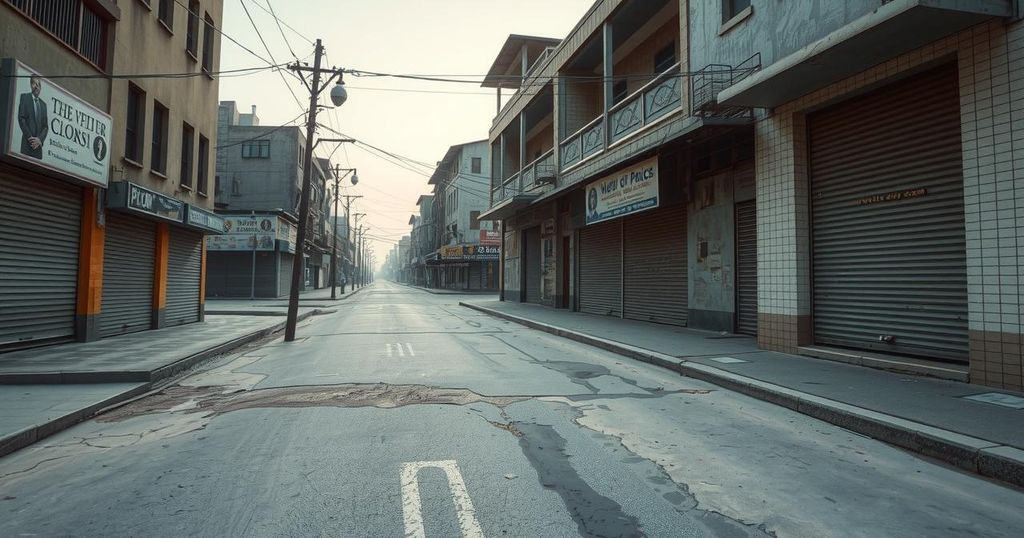Political Analyst Warns Against Fragile Protests in Zimbabwe, Calls for New Unity

Zimbabweans largely refrained from participating in recent protests, with political analyst Eldred Masunungure noting fear of state violence as a primary reason. Calls for an indefinite stay-away were largely ignored due to survival concerns. He emphasized the necessity for a dependable political organization for effective opposition, reflecting on the ongoing fragility of politics, economy, and society in Zimbabwe. Masunungure suggested a replication of the past Government of National Unity to navigate future challenges.
At the end of March 2025, Zimbabwe witnessed a significant absence of activity, with many citizens refraining from attending their workplaces, turning urban centers into unsettling empty spaces. Political analyst Eldred Masunungure from the University of Zimbabwe noted that this situation arose not from organized street protests, but rather from a cautious recognition of the risks associated with confronting the government led by President Emmerson Mnangagwa. Masunungure explained that citizens understand the potential violence they would face from state authorities, as the regime is prepared to deploy its forces against dissenters quickly. Protests are generally banned in the country, making any form of defiance quite perilous.
Masunungure stated, “people responded to Geza’s call for an uprising by staying at home which is a form of protest in itself.” On the other hand, Geza’s recent appeal for an indefinite stay-away was largely overlooked by many citizens, who viewed the call as ill-timed and detrimental to their survival needs. He articulated that a majority of the populace relies on informal work, like vending, and participating in an indefinite stay-away would be immensely risky, thus they chose to ignore it. “It is plain common sense,” he noted.
The political landscape appears fragmented, and Masunungure pointed to insufficient organization as a contributor to the failure of the recent stay-away efforts. He remarked, “The so-called ‘Geza movement’ is essentially a solo effort by Geza himself and in politics, this is not sustainable.” This disconnection has left numerous citizens politically orphaned, especially following the decline of both the Movement for Democratic Change (MDC) and the Citizens Coalition for Change (CCC).
Masunungure’s poignant commentary on Zimbabwe’s political state highlighted an urgent need for a robust, trustworthy political framework capable of uniting those disenchanted with the ruling Zanu PF party. He expressed the dire situation: “The tragedy of Zimbabwe’s opposition politics today, the lack of a viable and trusted organizational vehicle to accommodate the multitudes of political orphans.”
With Zimbabwe mired in chronic fragility that manifests economically, socially, and politically, Masunungure illustrated the bleak state of affairs as one of confusion and despair. “The industrial-scale corruption, high unemployment rates, and a collapsing currency contribute to the environment of uncertainty,” he explained. He contended that the revival of Zimbabwe hinges on replicating the successful Government of National Unity (GNU) seen between 2009 and 2013, a model that many citizens remember fondly.
However, he underscored skepticism regarding the feasibility of achieving such unity under a regime that stifles dissent from civil society and non-state actors through various means. Referring to the PVO Amendment Act and other tactics aimed at weakening civil societal influence, Masunungure expressed concern about the long-term implications of these developments. Despite this bleak outlook, there is a ray of hope: he suggested that religious institutions could play a crucial role in facilitating national dialogues to achieve GNU-like solutions. Yet, regional leadership, particularly within the SADC, would also be needed to steer such processes.
In his closing remarks, Masunungure was realistic, indicating that Zimbabwe’s ongoing uncertainty, confusion, and volatility are likely to persist into the foreseeable future.
Overall, the region’s political dynamics are tense and fraught with challenges, and until fundamental organizational changes in political structures occur, progress remains stagnant and elusive.
In conclusion, the political landscape in Zimbabwe remains unstable with citizens exhibiting caution in expressing dissent against the ruling regime led by President Mnangagwa. The failure of recent protests signifies a dire need for a cohesive political organization to support those disenchanted with the ruling party. With historical references to the Government of National Unity, there are whispers of potential revival, although substantial hurdles, including governmental suppression and socio-economic distress, loom large. Without meaningful change, uncertainty and chaos are anticipated to continue in the nation.
Original Source: www.newzimbabwe.com







